Hong Kong issued 1,115 private-hire-car permits, but 14,000 drivers are registered with Uber. Conventional taxi numbers are below market demand as the pool of drivers ages. The taxi-license cartel has frozen new licenses over two decades. Looser restrictions on ride-hailing services are expected this year, Zhang Tianyuan reports from Hong Kong.
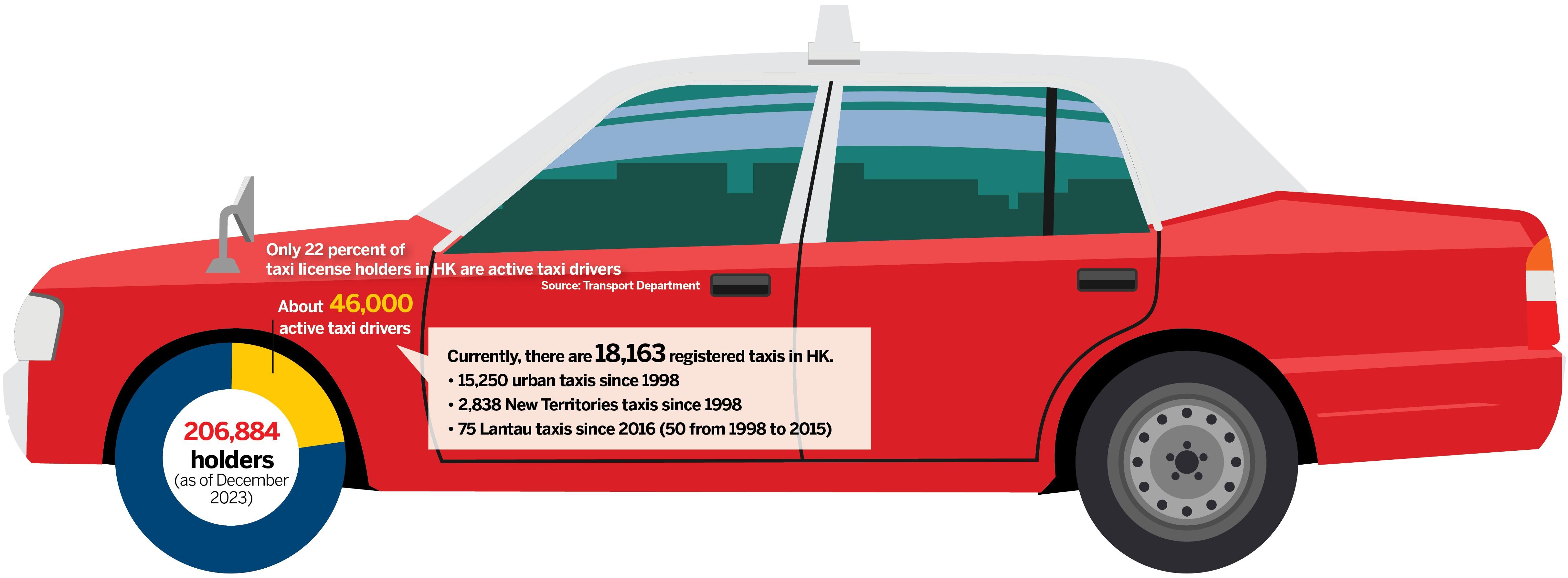 (INFOGRAPHICS: DONG KAI, MOK KWOK-CHEONG)
(INFOGRAPHICS: DONG KAI, MOK KWOK-CHEONG)
The government has capped taxi licenses at 18,088 since 1998 for urban and New Territories taxis. No new licenses for either have been issued since, holding supply artificially below market demand for nearly three decades. In 2016, the government issued 25 new Lantau taxi licenses, increasing its number from 50 to 75. Taxi licenses have no expiration date, which is a peculiar anomaly. They trade freely in the secondary market, with no stamp duty. This designed scarcity and hassle-free license trade inflates value. An oligarchy of taxi license owners holds them tight.
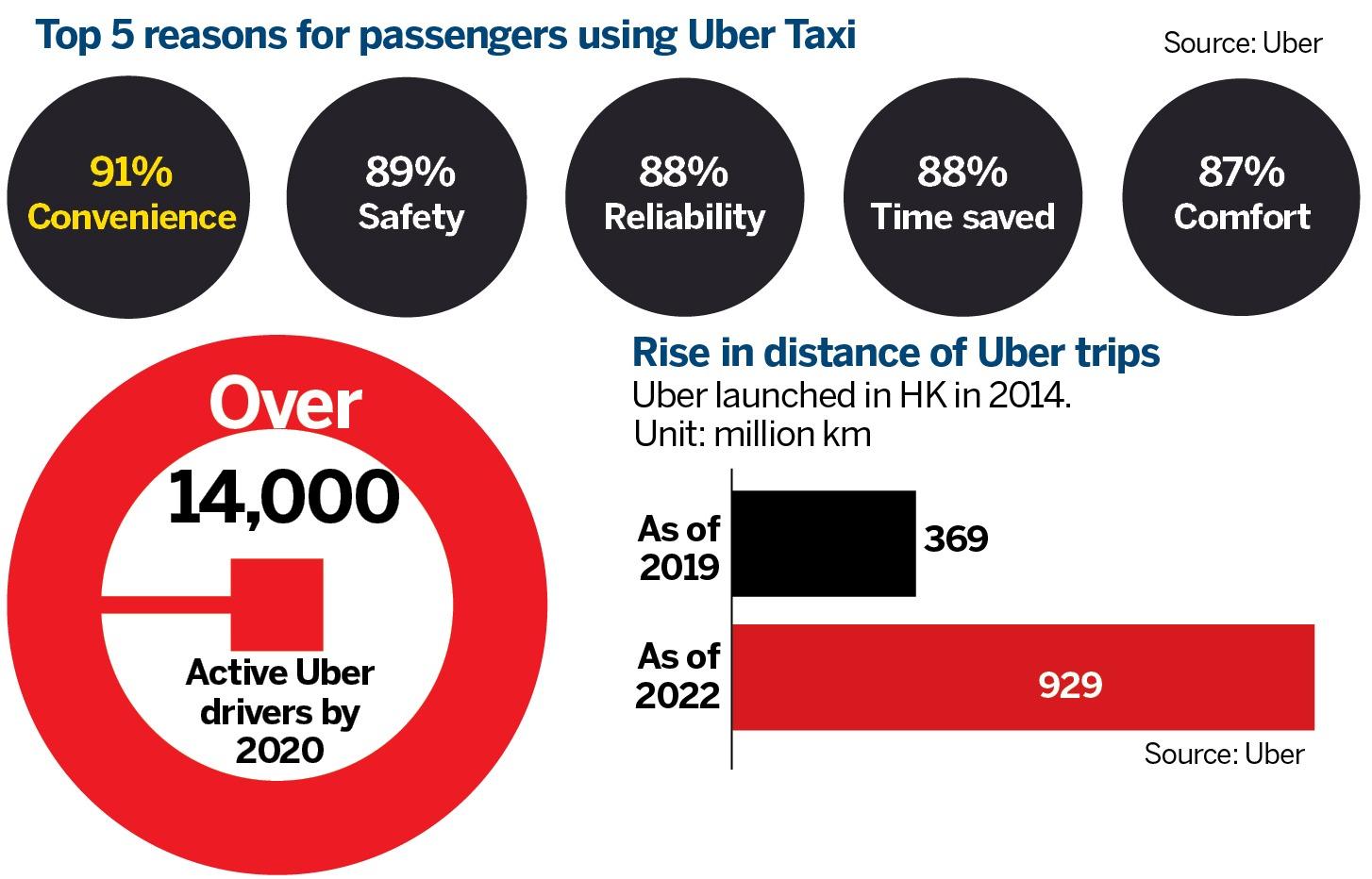
Artificial license trade
The price of a taxi license peaked at HK$7.25 million ($927,000) in 2015, moderating to HK$4 million now. The license-owner cartel has much at stake. It has strong rationale to delay alternative point-to-point transport development in Hong Kong. The uncertainties in the outcome between rising resident displeasure and administrative vacillation are damping the trade.
The license-oligarchy had enough sway to halt the issue of new licenses, and contribute to the stalled legalization process for ride-hailing. Residents are inconvenienced, and visitors even more so. They expect an adequate supply of taxis on the road, competitive choice, better service, and fairer rates.
The suppressed ride-hailing is awkward for Hong Kong’s “smart city” reputation, technology hub ambition, and first world claim. However, the unfair competition with ride-hailing services, which activates taxi driver street protests, must be addressed to foster a healthy business environment, and secure passengers’ rights.
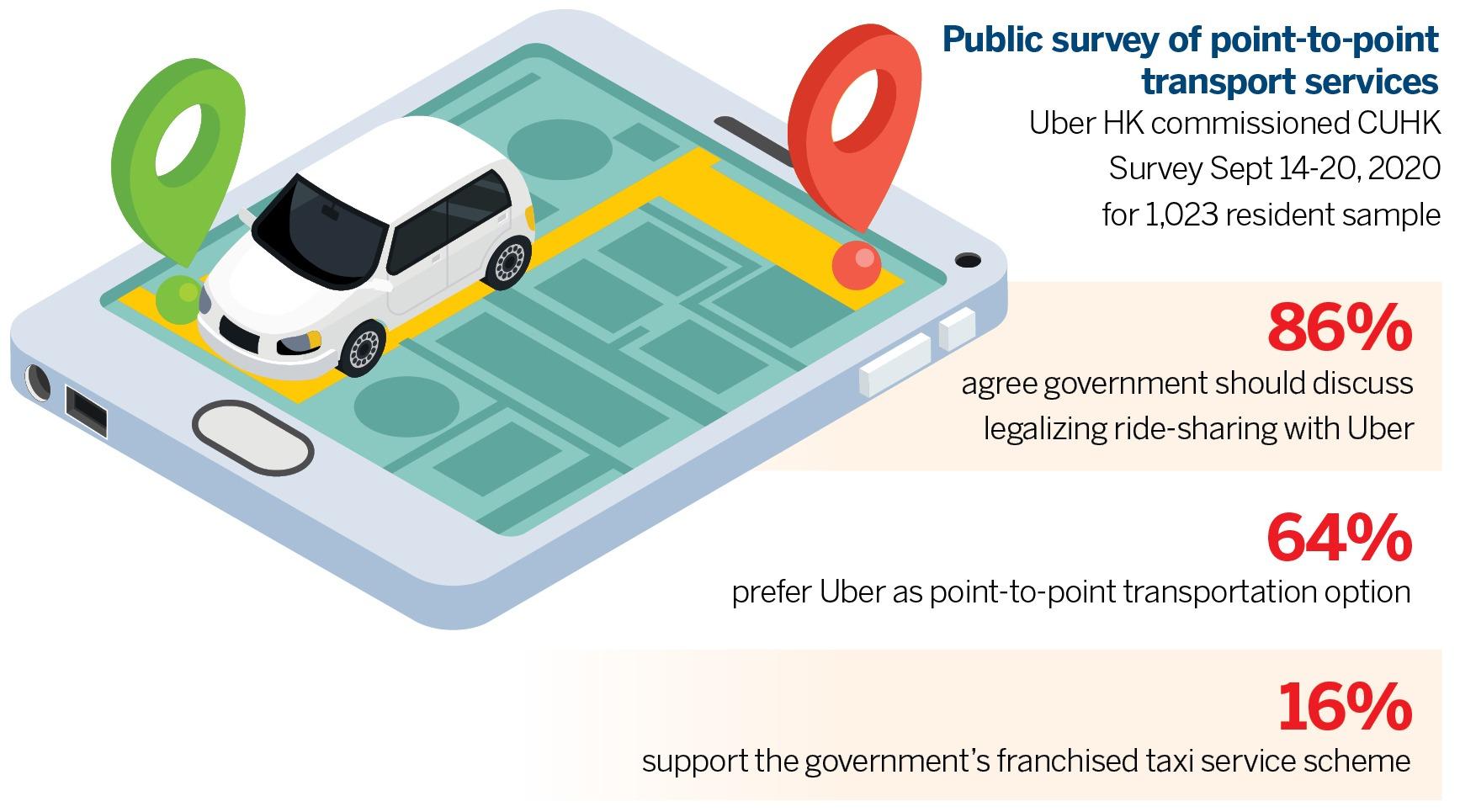
Given the overhang of consumer demand over supply, a gray zone has emerged, of 14,000 registered Uber drivers, where only 1,115 ride-hailing permits for private services have been issued. Most of these “gray” drivers operate without a hire-car permit or third-party insurance, constituting potential risk to passengers, if involved in an accident. They also offer unfair competition to Uber drivers who pay for hire-car permits and third-party insurance.
Alex Liu Kin-sing, managing partner at law firm Boase Cohen & Collins, Solicitors & Notaries, and a panel chairman of the Transport Tribunal, said, “It is generally agreed that a resident is not breaking the law in using a ride-hailing service, but the driver is. While this remains the position, the public will continue using Uber and other such services.”
Residents have shown they are prepared to pay a premium for better cars and drivers, full digital convenience from booking to credit card payment, to driver reviews, said Liu. Regarding residents’ rights, there is a strong argument that they should have access to the best possible transport options offering safe, clean, efficient and convenient services.
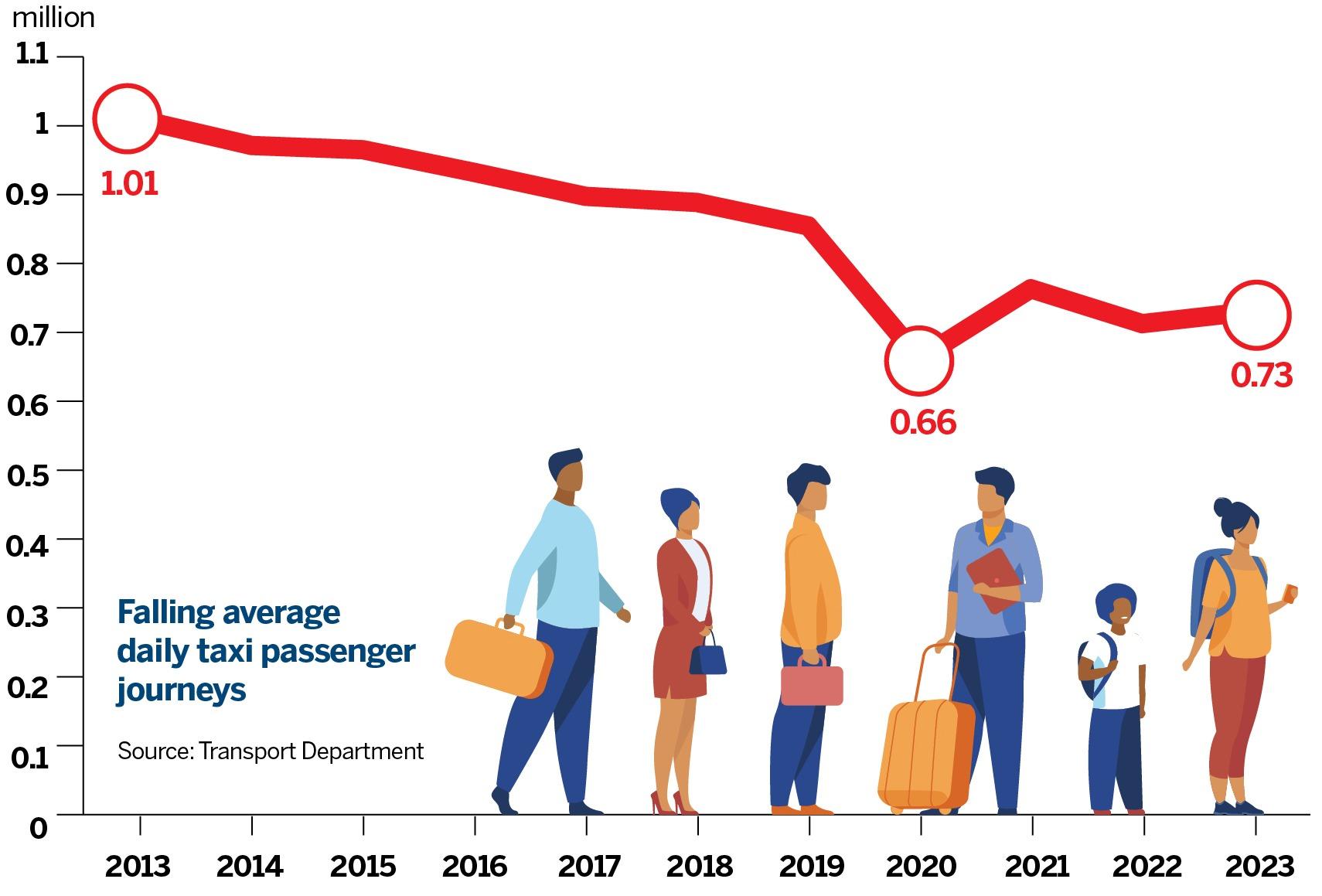
Digital efficiency
Sam Hui Kin-sang, CEO of CabCab, which launched Hong Kong’s first smart taxi meter, said ride-hailing services are bolstering smart transportation systems by streamlining communication between drivers and passengers, enabling quicker and more direct routes for pickups.
“The services cut down the number of vehicles roaming for rides, easing traffic congestion and reducing environmental pollution. Besides, these services supply valuable data on the travel patterns of passengers at various times and locations, which helps traffic planners in managing transportation infrastructure,” said Hui.
“Offering digital payment options is a crucial step in legitimizing ride-hailing services, for tourists and business travelers who may not carry cash in Hong Kong dollars. Digital payment can boost Hong Kong’s reputation as an innovation and technology center,” he added.
From Jan 25, passengers have the option to pay for taxi rides using UnionPay or AlipayHK through the updated Octopus payment app, available to 21,000 taxi drivers.
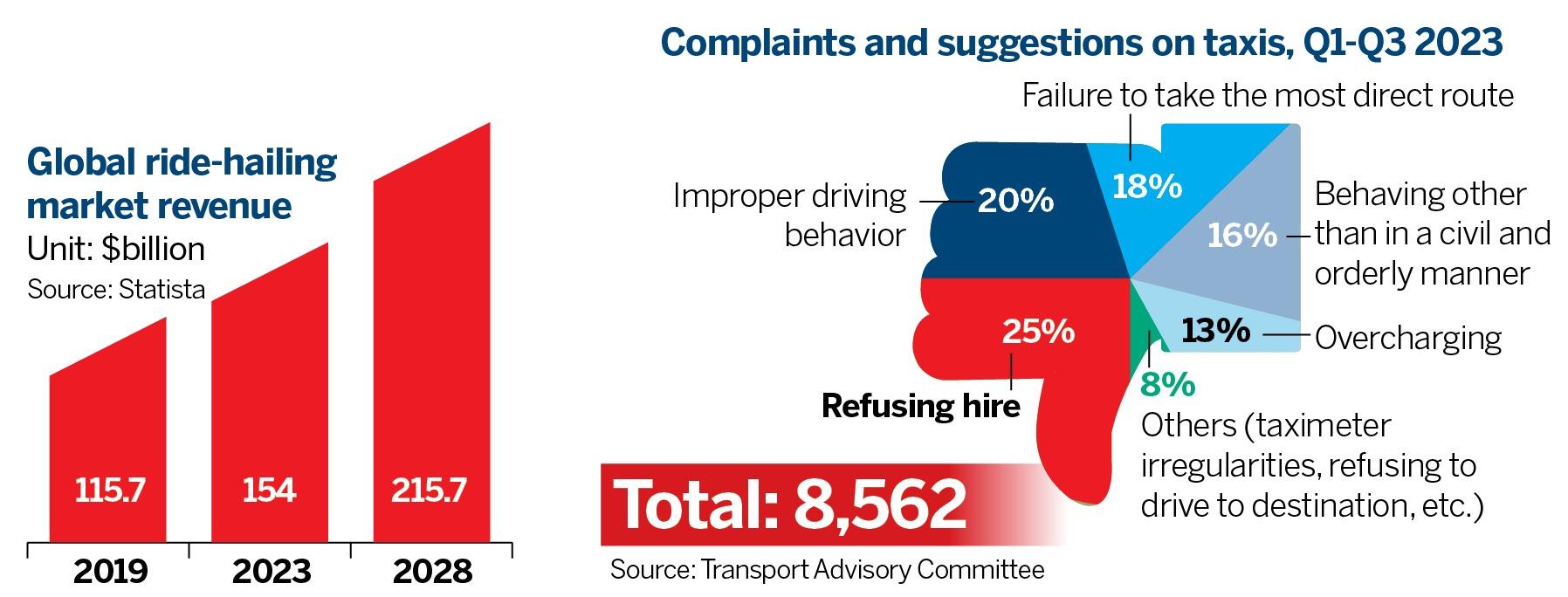
Ride-hailing services have become a favored alternative to conventional taxis since Uber entered the Hong Kong market a decade ago. But they are illegal unless the vehicle possesses a hire-car permit. The government set a limit of 1,500 hire-car permits for private services, but only 1,115 were taken up as of 2022.
Stringent criteria — a vehicle with a minimum taxable value of HK$300,000, and no older than six years at the time of application — contributed to the low number of permit applicants.
“The current regulations will limit the variety of point-to-point transport service providers available to residents and visitors,” said lawmaker Doreen Kong Yuk-foon. She urged the government to raise the cap on hire-car permits for private vehicles. “This can provide residents with high-quality services and alleviate the situation of taxi drivers suffering low income due to the high rentals charged by the leasing companies,” added Kong.
Ivan Chu Siu-lun, member of the Chinese Association of Hong Kong and Macao Studies, said the taxi market should be open to ride-hailing services to foster healthy competition, and thus improve service quality. “The traditional taxi sector must adapt to changes,” he said.
“When regulating ride-hailing services, regulators must mandate ride-hailing service drivers purchase insurance to protect passengers and maintain vehicle safety. The insurance for ride-hailing services differs from that of private vehicles due to the higher risks involved, necessitating comprehensive coverage for all parties,” said Chu. “Authorities should manage the number of ride-hailing cars on the road with fair and explicit conditions.”
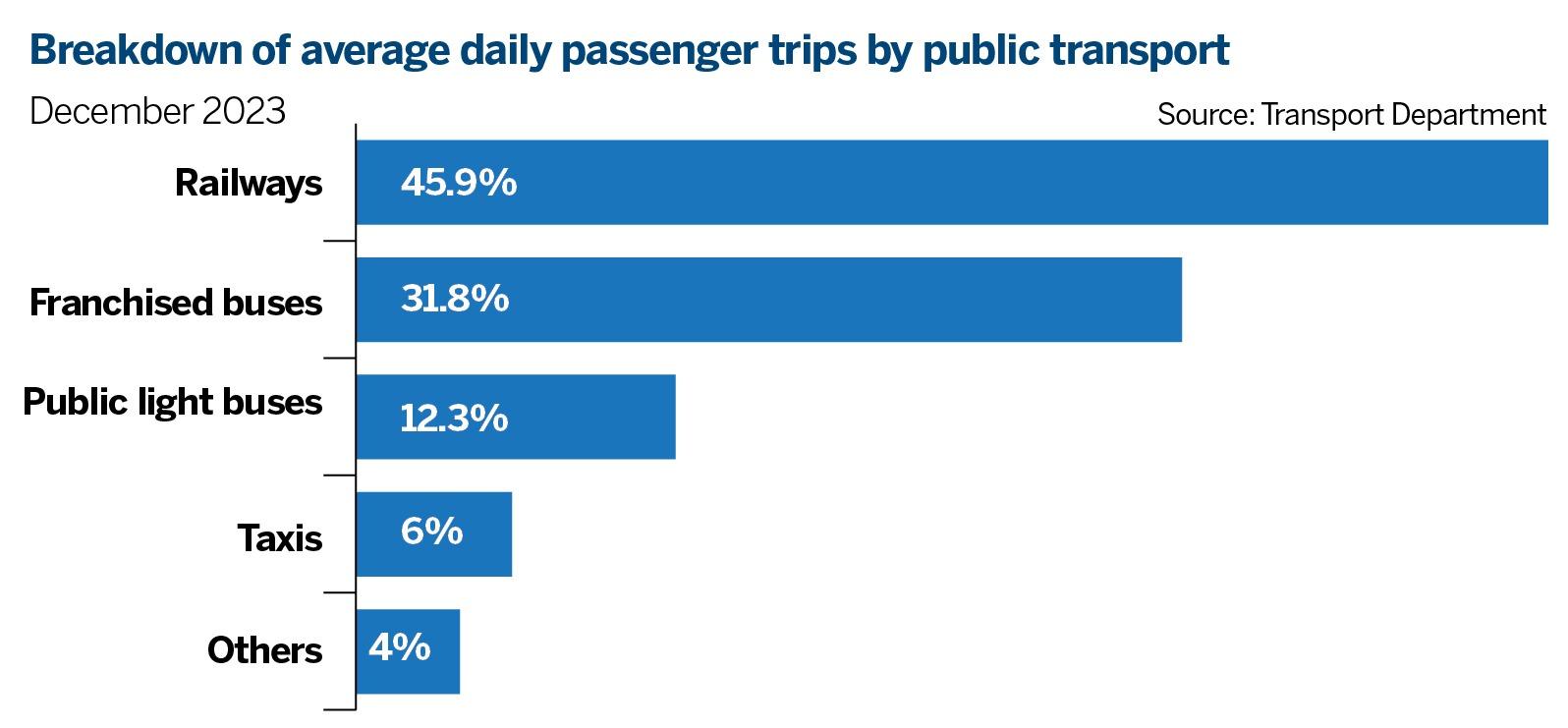
Unresolved dilemmas
Wu, a local taxi driver, said his earnings from Uber rides are not profitable after sharing with the platform. Wu registered with the ride-hailing app two years ago. Another Uber driver Kam told a local newspaper that one-fourth of his income went to the platform. After deducting these extra fees and fuel costs, Kam only earned about HK$550 per day.
Wu was angry with private vehicles registered with Uber but without the hire-car permit. He said this practice is cutting into legitimate drivers’ earnings. “Some of these unauthorized cars avoid paying for insurance. It is unfair,” he said.
Taxi license-owners are calling for stricter regulation of ride-hailing services. Lawmaker Kong cautioned the government to consider carefully before prohibiting what are currently alleged “illegal services”, noting that the existing number of taxis is insufficient to satisfy public demand.
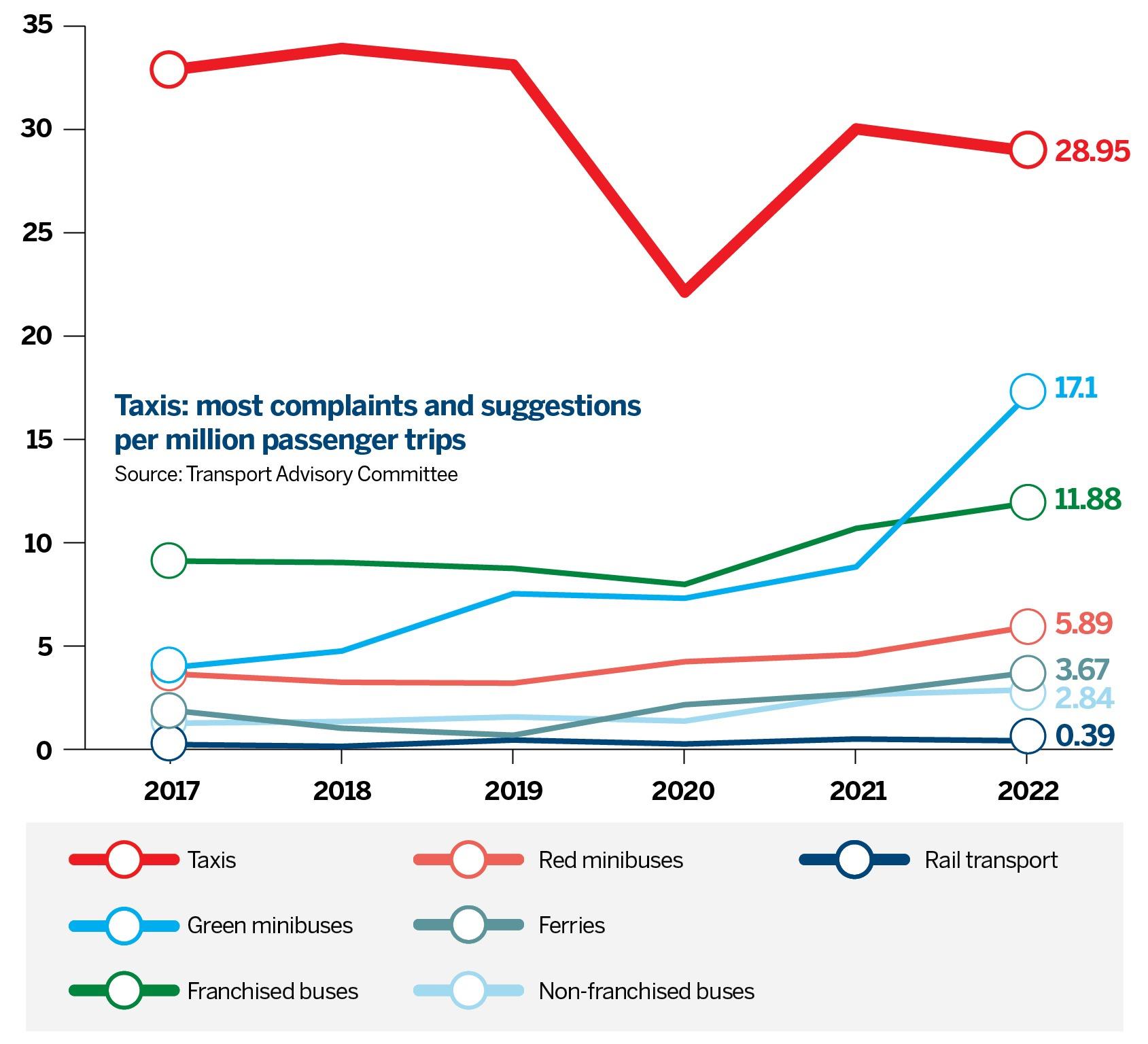
The aborted strike involving 1,000 drivers last year, was preceded by a similar strike in 2018. The taxi trade claimed that Uber cost them over HK$20 million in revenue each day. According to the Taxi Drivers and Operators Association, the average monthly net income of Hong Kong taxi drivers is 20 percent less than the average for the transport sector. Data from the fourth quarter of 2021 showed that taxi drivers’ monthly income was HK$18,100 to HK $19,600, below the city’s average monthly salary for the transportation industry, of HK$22,432.
The tight grip on taxi licenses allows the license cartel to earn substantially from rentals. Hong Kong taxi drivers need to pay up to tens of thousands of Hong Kong dollars in monthly rent. According to local dealership websites, current taxi rentals are HK$370 to HK$560 for day shifts and HK$310 to HK$470 for night shifts.
CabCab’s Hui suggested the government regulate new taxi industry entrants by imposing licensing rules to ensure alignment with existing stakeholders. Moreover, these new operators should maintain a pricing strategy that does not undercut traditional taxi drivers — for a duration.
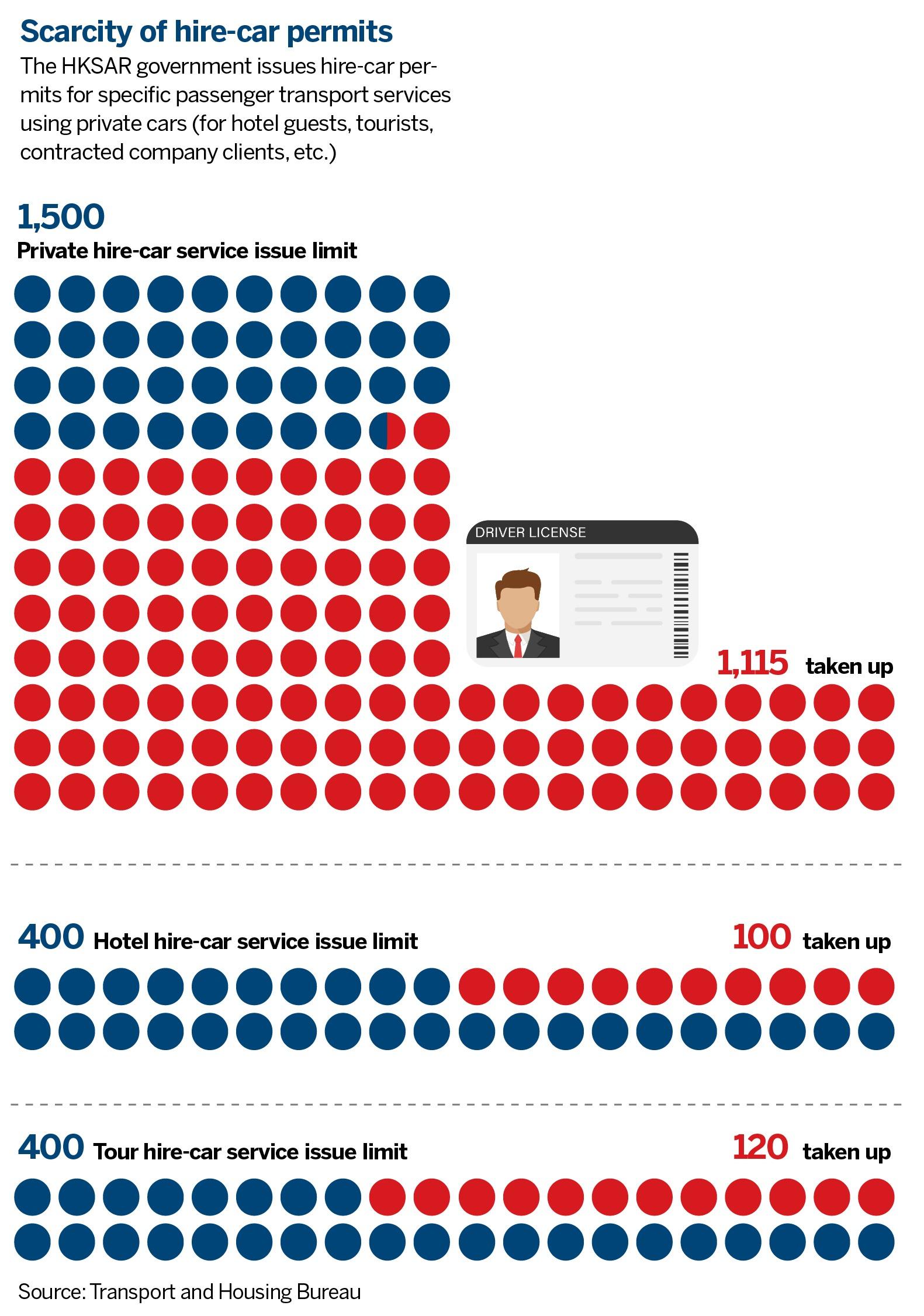
Rising complaints
Transport Advisory Committee data revealed that the number of customer complaints and suggestions against taxi drivers soared to 8,562 in the first three quarters last year. Among these, the most common issue was a refusal to take passengers. Although ranked fourth in average daily passenger journeys among the seven major public transport modes, the taxi sector faces growing criticism over its service quality.
Shift workers after midnight have difficulty securing a taxi. Hu, an employee of a media company, suffered on three occasions when taxis refused to take her from Aberdeen to Mong Kok, after finishing work at 2 am. She had few bus options for commuting home at those hours. She discovered HKTaxi, a popular cab app (acquired by Uber in 2021). Hu is now a regular user. “Even though I sometimes have to wait over 10 minutes for a taxi to arrive, the likelihood of securing a ride has improved,” she added.
There is concern that the conventional taxi driver population is aging and few younger drivers are opting to replace them under the terms offered by the taxi daily rental system. More than half were already over 60 years old in a 2022 Transport Department survey. Those above 70 years old reached 31,000 in the same survey.
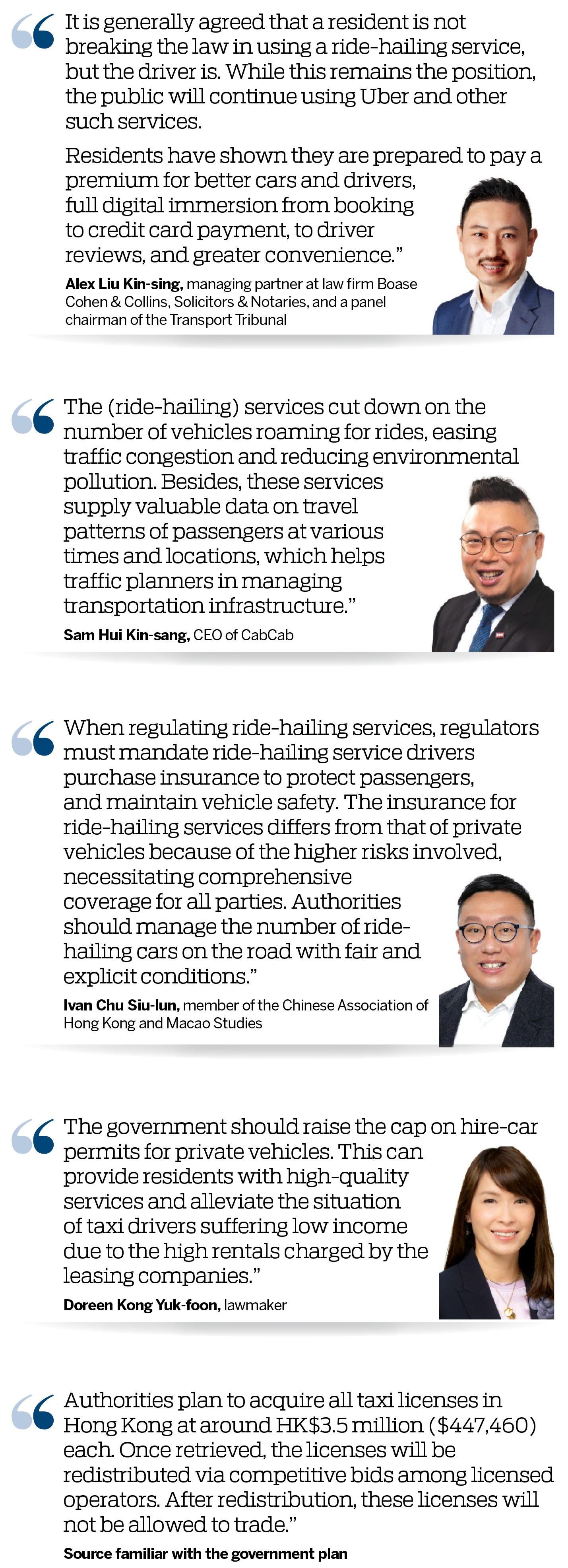
A Chinese University of Hong Kong survey in 2020 revealed that over 80 percent of the 1,023 respondents said they believe the transport authority should engage with Uber, for the legalization of ride-sharing services.
Transportation and Logistics Secretary Lam Sai-hung has pledged to tackle online ride-hailing regulations and roll out a proposal for public discussion this year. A knowledgeable source indicated authorities plan to acquire all taxi licenses in Hong Kong at around HK$3.5 million each.
Once retrieved, the licenses will be redistributed via competitive bids among licensed operators, the source added. After redistribution, these licenses will not be allowed to trade. “The purpose of taxi licenses is public operations, not for personal investment,” stressed the source.
“This new practice will improve taxi drivers’ income and enhance revenue stability. Under the new plan, taxi operators are expected to offer drivers a fixed monthly salary, and drivers will pay their rental fees every month.”
What's next
Taxi licensing regime to be overhauled mid-year to improve customer services and drivers’ incomes.
New taxi licensing regulations expected to attract young people into the sector.
The Hong Kong government to regulate ride-hailing to ensure passenger safety and to meet market demand.
Digital payments and smart meters to accelerate digital transformation of the taxi industry.
Contact the writer at tianyuanzhang@chinadailyhk.com


